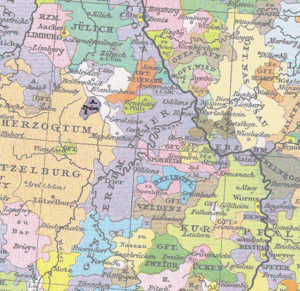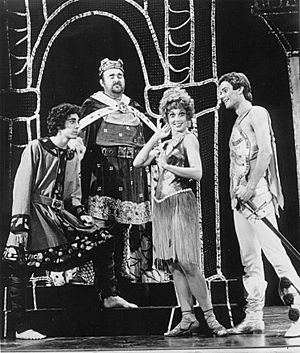Pepin the Hunchback facts for kids
Quick facts for kids Pepin the Hunchback |
|
|---|---|
| Born | ca. 768 or 769 Frankish Empire |
| Died | 811 (aged 42) Prüm |
| Dynasty | Carolingian |
| Father | Charlemagne |
| Mother | Himiltrude |
Pepin, also known as Pippin the Hunchback (born around 768 or 769 – died 811), was a Frankish prince. He was the oldest son of the famous emperor Charlemagne and a noblewoman named Himiltrude. Pepin was born with a humped back, which is why historians later called him "the Hunchback."
Even after Charlemagne ended his relationship with Himiltrude and married Hildegard, Pepin continued to live at his father's royal court. However, around 781, Charlemagne's younger son, Carloman, was given the new name "Pepin of Italy." This change might have meant that Charlemagne decided not to make the older Pepin his heir. In 792, Pepin the Hunchback joined a plot with some Frankish nobles to overthrow his father. The plan was discovered before it could happen. Charlemagne chose not to execute Pepin. Instead, he had Pepin's head shaved (a process called tonsure) and sent him to live in the monastery of Prüm. Pepin died in 811. His life story has inspired many historical fiction works.
Contents
Who Was Pepin's Mother?
The exact details about Pepin's mother, Himiltrude, and her relationship with Charlemagne are not fully clear today. Many historical writings from the Carolingian era suggest that Charlemagne's first union with Himiltrude was not considered a proper, legal marriage by the Church.
It's possible their union was a Germanic type of marriage. This kind of marriage had fewer rules than the Church's official marriage ceremonies. Another idea is that they simply were not fully married by the Church, or they got married after Pepin was born. What we know for sure is that Charlemagne had a son with a woman named Himiltrude.
Why the Name Pepin?
Understanding naming customs from that time helps us learn more about Pepin's birth. Important families like the Carolingians often named their children after successful ancestors. This was more than just honoring dead relatives. It was believed that naming a child after an ancestor could help them take on the same important roles.
The name "Pepin" was very important in Charlemagne's family. It was the name of Charlemagne's father and many other members of the royal family. In fact, Charlemagne's brother, Carloman, named his first son Pepin even before Charlemagne was married. So, it made sense for Charlemagne to name his first son "Pepin." This showed his own plans for his family's future and hinted that his son might one day become emperor. However, a writer named Notker the Stammerer, who wrote much later, suggested that Himiltrude (Pepin's mother) was the one who chose the name.
Pepin's Changing Status
Pepin seemed to stay at his father's court even after Charlemagne sent his mother, Himiltrude, away. Charlemagne then married Desiderata, a Lombard king's daughter, around 770. Pepin's position at court became less secure after Charlemagne married Hildegard. She gave birth to new sons, like Charles the Younger (born 772) and Carloman (born 773).
In 780 or 781, Charlemagne had the young Carloman baptized by Pope Hadrian in Rome. During this ceremony, Carloman was renamed Pepin. A poet from that time, the Poeta Saxo, wrote that Charlemagne "attended the solemnities of Easter [and] the venerable Pope administered soul-saving baptism to Charles' son Pepin [formerly Carloman]." This meant Charlemagne now had another, seemingly more suitable, son named Pepin. Many historians believe this was the start of Pepin the Hunchback losing his place as an heir.
However, there aren't many clear documents from that time. Some historians even argue that Pepin still had a full right to inherit the kingdom until his rebellion in 792.
Why Pepin Might Have Been Disinherited
Charlemagne cared a lot about who would take over after him. He even chose not to marry his daughters to Frankish nobles. This was unusual and probably showed he didn't want any problems with who would inherit the throne. Even with Pepin's unclear birth and his physical condition, sources suggest Charlemagne treated him with kindness.
Even after Carloman was renamed Pepin, the older Pepin stayed at court. He was there alongside Charles the Younger, another of Charlemagne's sons. In 806, Charlemagne named Charles the Younger "King of the Franks" when he divided his kingdom. Some historians think this means Pepin the Hunchback was also being prepared for kingship before his rebellion. They believe renaming Carloman was more about politics outside the family than about disinheriting the original Pepin.
However, other historians believe that renaming Carloman was a clear sign that Pepin was being rejected. They point out that Charlemagne's plans for who would rule next didn't include a king with a humped back. They suggest that Pepin might have been offered a deal: give up his claim to the throne, and he could become a bishop.
There are also more definite reasons to think Pepin was passed over. While he stayed at court, his half-brother Charles the Younger went with their father on important military campaigns. Charles the Younger even led large groups of soldiers. This showed that Charlemagne was giving Charles the Younger more important duties, while Pepin was left out.
Also, ideas about marriage were changing. Charlemagne's relationships, even with his wives, were sometimes criticized. Some religious leaders wanted to follow strict Catholic marriage rules. These reformers would have rejected the old Germanic marriage customs that Himiltrude and Charlemagne might have followed. This shift in what was considered a proper marriage might have pushed Pepin further into the background. If Charlemagne wanted to promote strict Catholic rules, he might have felt he needed to distance himself from Pepin, who represented an older, less accepted type of union.
The Revolt
In 792, Pepin the Hunchback tried to overthrow his father. He worked with a group of Frankish nobles who were unhappy with Charlemagne. However, the plan was discovered and stopped before they could do anything.
The royal court found all the people involved guilty. Their lands were taken away, and they were sentenced to death. But some of the plotters, including Pepin, were spared. Charlemagne likely didn't want to kill his first-born son, whom he still seemed to care for.
Monastic Life and Death
Pepin became a monk and went to live at the Abbey of Prüm. This abbey was located far from the center of Charlemagne's empire, near the Rhine and Moselle rivers, north of modern-day Luxembourg. It was a suitable place for exile. Pepin spent the rest of his life there, away from political problems.
In 806, Charlemagne wanted to make sure there would be a smooth transfer of power after he died. He issued a royal order called the divisio regnorum. This order divided his kingdom into three separate territories. These lands were to be given to his three "remaining" sons: Charles the Younger, Pepin (the one formerly named Carloman), and Louis. Pepin the Hunchback was still alive at this time, but he was not included in this division. Historians debate whether this was because of his 792 revolt or because of the questions about his birth.
Pepin died around 811 while at Prüm, likely from a plague. Historians disagree on the exact date, but evidence suggests it was between 810 and 811. The Royal Frankish Annals recorded his death as July 8, 810.
In Fiction and Popular Culture
The famous 1972 Broadway musical Pippin, created by Stephen Schwartz and Roger O. Hirson, is loosely based on the historical Pepin the Hunchback. The musical was very popular. Its first New York show ran for almost five years and won many Tony awards. It returned to Broadway in 2013 with a successful revival that also won several Tonys.
In her 1959 children's novel Son of Charlemagne, author Barbara Willard tells the story of Charlemagne's family. She adds details to historical accounts to create a historical-fictional story. In the book, when Carloman is baptized and renamed Pepin, he feels upset as he realizes he is taking his older half-brother's place.
A short story by Alexandre Dumas, "Episodes from Pepin et Charlemagne," has sometimes been wrongly thought to be about Pepin the Hunchback. However, the story is actually about his namesake and grandfather, Charlemagne's father Pepin.
The DC comic Arak, Son of Thunder (1981–1985) was set during Charlemagne's time. It featured Pepin (called Pip) in its backup comic strip, Valda the Iron Maiden.
Images for kids
See also
 In Spanish: Pipino el Jorobado para niños
In Spanish: Pipino el Jorobado para niños
 | William M. Jackson |
 | Juan E. Gilbert |
 | Neil deGrasse Tyson |




